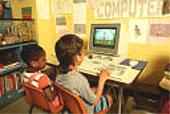 |
Internet Safety
- Gary Direnfeld

We all trust our children. However, the issue here is not trust but curiosity - the kind of curiosity that can lead to good things - or to danger.
Rahul and Ritu were 11 and 12 respectively. They belonged to decent, respectable families, and were bright and sensible children. They had never been in trouble before. So when they were caught performing acts of sex uncharacteristic of children their ages, it was a complete shock to their parents. Whatever possessed them to indulge in such behavior? The answer is simple: The internet. They were simply trying out what they came across while browsing the internet. They had seen thousands of perverse and sexually graphic image, which lead the children to believe kinky sex was normal. They had to try it.
Our lives have changed. With the Internet we have invited the world into our homes: the good, the bad and the ugly. In less than seconds we can be transported around the world and can access information otherwise unavailable. There are remarkable advantages to the internet as well. We can communicate with friends and loved ones easily. We have access to education and to services. But the downside is that any wrong turn can be exposed us to dangerous information, ideas, images, behaviour. Children can even be lured to their deaths.
Look out for these warning signs that may signal your child is accessing adult sites.
1. Spending increased time on-line to the exclusion of other friends and prior preferred activities.
2. Surfing the Internet with the door closed and when you approach, you hear a flurry of mouse-clicks as your child quickly deletes information or changes web pages.
3. An increase in sexual behaviour or talk of adult on-line friends, particularly if this leads to meeting unknown persons.
Think of the Internet as a big lake. There are shallow spots and deep spots. You would never throw your child into the lake without supervision, without learning to swim or without learning of the dangerous areas. You would never let your children swim in the dark. Like learning to swim, these strategies may protect your child from harm on the Internet:
1. Purchase and install "blocking software". Such software prevents adult web sites from appearing on your computer. This is ideal if you have younger children that may stumble on a pornographic website without meaning to do so. Ask at your local computer store for a recommendation on which software to use.
2. Keep your computer in a public area in your house such as your bedroom, the family room or hallway. This will kill motivation for children to browse pornographic sites. Porn needs secrecy to survive. No secrecy, no porn.
3. If the computer is to remain in your child's room, the door MUST be open when the Internet is in use. There is no reason for your child to lock the door and browse on the Internet, so make sure he never does so.
4. Check the Temporary Internet Files and History Folder on the computer. The rule is, no deleting these files. Parents are advised to view these files periodically. These files will show you exactly what has been viewed and which web sites were accessed. They even will show date and time. No files, no computer.
5. Make sure you learn the use of the computer yourself, or your child will be able to get away with surfing many sites confident in the knowledge that you will never know what he is up to.
Remember, safety on the Internet is not a matter of trusting your child. It is not your child's fault that enticing information is a fingertip away. It is a matter of understanding childhood curiosity and the trouble that it can cause. It is always up to the parents to protect children from harm and learn the strategies to do so. Our mission is to nurture them and keep them safe from harm in any form.
To see other article by Gary Direnfeld or contact him: click here
To add your views on
this article or read other comments, click here.
Back to Previous Page
More on Raising Children Index

Email this Article to a Friend
|


